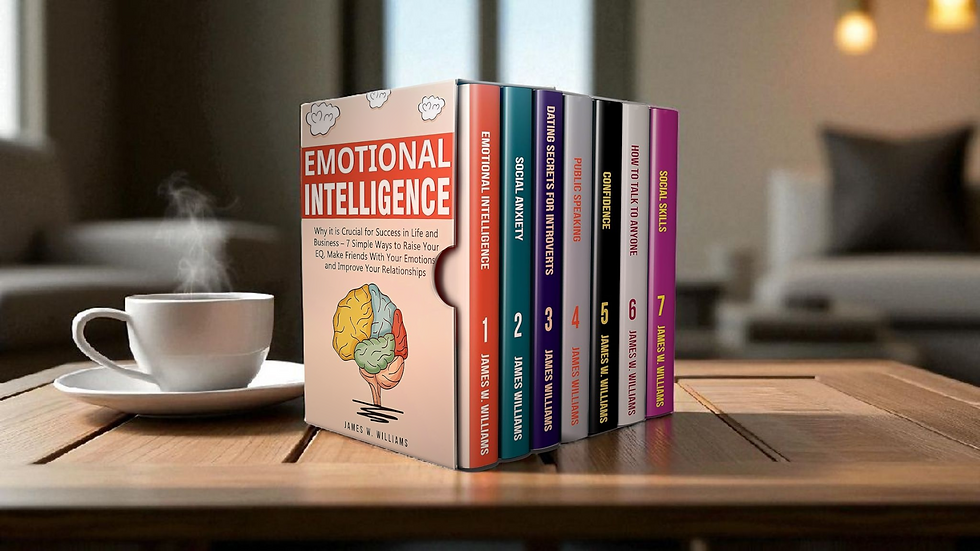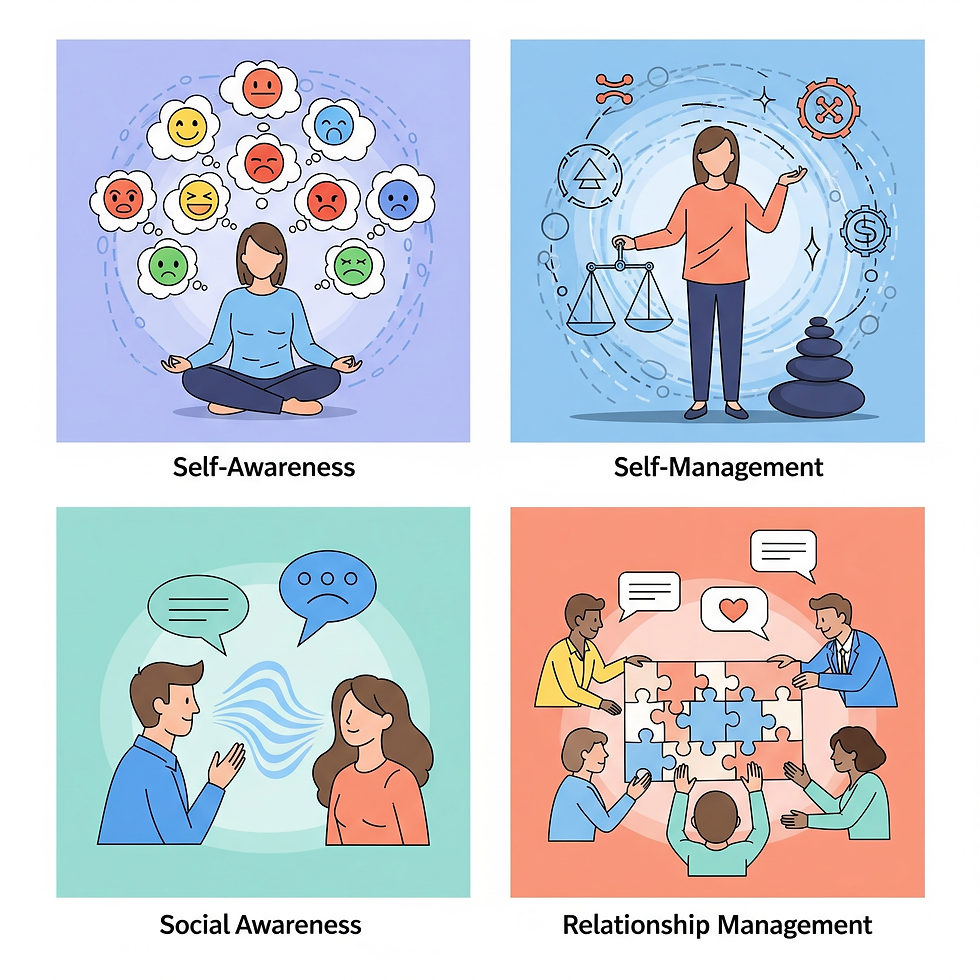情緒智商:職場的隱形超能力
- Bruno Huang 黃鼎翰 / 老黑

- 2025年9月8日
- 讀畢需時 6 分鐘
Emotional Intelligence: The Invisible Superpower at Work
在當今快節奏的世界中,成功不僅僅取決於智商(IQ)。越來越多的研究和企業領導者開始認同,情感智商(EQ)在個人與職業發展中扮演著更為關鍵的角色。James W. Williams 在他的著作 《Emotional Intelligence》 中,深入淺出地闡述了這一觀點,並提供了提升自身 EQ 的實用指南。
In today’s fast-paced world, success isn't just about your Intelligence Quotient (IQ). A growing number of studies and business leaders now agree that Emotional Intelligence (EQ) plays a more critical role in both personal and professional growth. In his book 《Emotional Intelligence》, James W. Williams explains this concept with great clarity and provides a practical guide for boosting your own EQ.

什麼是情感智商?
What is Emotional Intelligence?
情感智商,簡而言之,是識別、理解、管理和有效利用自己及他人情緒的能力。Williams 將其分為四個核心要素:
自我覺察 (Self-Awareness):能準確識別並理解自己的情緒、優勢、劣勢和價值觀。
自我管理 (Self-Management):能控制衝動、管理壓力,並在面對挑戰時保持積極。
社會覺察 (Social Awareness):能換位思考,理解他人的情緒、需求和擔憂。
人際關係管理 (Relationship Management):能有效溝通、解決衝突,並激勵他人。
Emotional Intelligence, in simple terms, is the ability to recognize, understand, manage, and effectively use your own emotions and those of others. Williams breaks it down into four core components:
Self-Awareness: The ability to accurately identify and understand your own emotions, strengths, weaknesses, and values.
Self-Management: The ability to control impulses, manage stress, and stay positive in the face of challenges.
Social Awareness: The ability to empathize with and understand the emotions, needs, and concerns of others.
Relationship Management: The ability to communicate effectively, resolve conflicts, and inspire others.

為什麼是 EQ 而不是 EI?
Why "EQ" Instead of "EI"?
這背後主要是一個歷史和行銷上的習慣。
The primary reason behind this is a matter of historical and marketing convention.
IQ (Intelligence Quotient) 這個詞早在 20 世紀初就已經被廣泛使用,用來衡量一個人的智力。當科學家和心理學家開始研究情感能力時,很自然地就借用了這個模式,創造了 EQ (Emotional Quotient) 這個詞,以便與 IQ 相對應。這種命名方式立刻讓人們理解,EQ 是一種與智力商數平行的「商數」,只是衡量的是情感能力。
The term IQ (Intelligence Quotient) was already in widespread use since the early 20th century to measure a person's intellectual ability. When scientists and psychologists began studying emotional skills, they naturally borrowed this established pattern, creating the term EQ (Emotional Quotient) to parallel IQ. This naming convention immediately helped people understand that EQ was a "quotient" parallel to the intelligence quotient, simply one that measures emotional capability.
EI (Emotional Intelligence) 則是一個更學術和技術性的名詞,由心理學家 Peter Salovey 和 John D. Mayer 在 1990 年首次提出。這個詞更多地被用在學術研究、論文和專業領域中,用來描述這個概念本身,而不是一個可量化的「商數」。
EI (Emotional Intelligence), on the other hand, is a more academic and technical term first proposed by psychologists Peter Salovey and John D. Mayer in 1990. This term is predominantly used in academic research, papers, and professional fields to describe the concept itself, rather than as a quantifiable "quotient."
簡單來說,EQ 是 EI 的通俗化版本。你可以把 EI 理解為**「情感智力」這個學術概念,而 EQ 則是這個概念的「情感商數」**,是它在社會大眾中更廣為人知的名稱,就像 IQ 一樣。
In simple terms, EQ is the popularized version of EI. You can think of EI as the academic concept of "Emotional Intelligence," while EQ is the "Emotional Quotient"—the more widely known name for it among the general public, just like IQ.
提升情感智商的十大益處
10 Main Benefits of Emotional Intelligence
Williams 在書中強調,高 EQ 不僅能讓你成為更好的同事或領導者,更能全面提升你的生活品質。他列舉了十大核心益處:
Williams emphasizes that a high EQ doesn’t just make you a better colleague or leader; it improves the overall quality of your life. He outlines ten key benefits:
做出更明智的決策:減少衝動性決策,做出更理性的選擇。
Making Wiser Decisions: Reduces impulsive choices and leads to more rational outcomes.
提升領導力:能更好地激勵、協調和管理團隊。
Enhanced Leadership: Empowers you to better inspire, coordinate, and manage your team.
改善人際關係:建立更深層次、更具意義的連結。
Improved Relationships: Helps you build deeper, more meaningful connections with others.
增強溝通能力:更有效地表達自己,同時也能更好地傾聽。
Better Communication Skills: Enables you to express yourself more effectively and become a better listener.
有效管理壓力:更好地應對生活中的挑戰與壓力。
Effective Stress Management: Equips you to better handle the challenges and pressures of life.
解決衝突的能力:能更冷靜地處理分歧,尋求雙贏的解決方案。
Conflict Resolution: Allows you to navigate disagreements calmly and find win-win solutions.
提升工作表現:能與同事更和諧地合作,提高整體生產力。
Increased Job Performance: Fosters harmonious collaboration with colleagues, boosting overall productivity.
增強自信心:對自己的情緒和能力有更清晰的理解。
Greater Self-Confidence: Leads to a clearer understanding of your emotions and capabilities.
提高適應能力:能更靈活地應對變化和不確定性。
Higher Adaptability: Makes you more flexible in responding to change and uncertainty.
改善身心健康:高 EQ 與較低的壓力和焦慮水平相關聯。
Better Mental and Physical Health: High EQ is linked to lower levels of stress and anxiety.
如何提升你的情感智商?
How to Raise Your Emotional Intelligence?
Williams 認為 EQ 並非天生,而是可以透過練習和自我反思來提升。他建議了幾個實用方法:
Williams argues that EQ isn't something you're born with; it can be developed through practice and self-reflection. He suggests several practical methods:
練習自我覺察:每天花時間反思自己的感受和情緒。問自己:「我現在感覺如何?為什麼會有這種感覺?」
Practice Self-Awareness: Take time each day to reflect on your feelings and emotions. Ask yourself, "How am I feeling right now? Why do I feel this way?"
學習同理心:在與人互動時,嘗試從對方的角度看問題。
Cultivate Empathy: When interacting with others, try to see things from their perspective.
主動傾聽:當別人說話時,放下你的手機,全神貫注地聆聽,而不只是等待發言。
Practice Active Listening: When someone is speaking, put your phone down and give them your full attention, rather than just waiting for your turn to talk.
尋求回饋:詢問值得信賴的同事或朋友,請他們給予關於你人際互動方式的誠實回饋。
Seek Feedback: Ask a trusted colleague or friend for honest feedback on how you interact with others.
EQ vs. IQ:企業主管的共識
EQ vs. IQ: The Consensus Among Business Leaders
許多全球知名企業的領導者都公開表示,在招聘和晉升決策中,他們更看重 EQ 而非 IQ。其中,前 Google 高階主管 Laszlo Bock 曾指出:「在 Google,我們發現 IQ 與工作表現的相關性最低。」同樣,星巴克前執行長 Howard Schultz 曾強調,他更傾向於僱用具備同理心和人際溝通能力的人才。
Many leaders of globally renowned companies have publicly stated that they value EQ over IQ in their hiring and promotion decisions. For example, former Google executive Laszlo Bock once noted, "At Google, we found that IQ is the least correlated with job performance." Similarly, former Starbucks CEO Howard Schultz has emphasized that he prefers to hire people with empathy and strong interpersonal skills.
這背後的原因很簡單:技術能力(IQ)可以透過培訓獲得,但團隊合作、領導力、適應能力和文化契合度等軟實力(EQ)則更難以培養。在高壓且不斷變化的商業環境中,具備高 EQ 的員工能夠更好地應對衝突、激勵團隊、保持韌性,並為公司創造更積極、更具生產力的氛圍。因此,Williams 的書為所有希望在職場和生活中取得更大成功的人,提供了寶貴的洞見和實用工具。
The reason behind this is simple: technical skills (IQ) can be taught through training, but soft skills like teamwork, leadership, adaptability, and cultural fit (EQ) are much harder to cultivate. In a high-pressure and constantly changing business environment, employees with high EQ are better equipped to handle conflicts, inspire teams, remain resilient, and contribute to a more positive and productive company culture. As a result, Williams's book offers valuable insights and practical tools for anyone looking to achieve greater success in their career and life.
.jpg)





留言